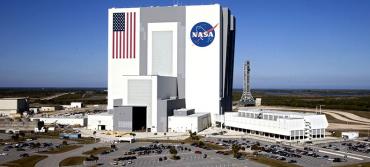
Following the midterm elections, Florida’s senatorial result and the Democratic takeover of the House of Representatives means there are questions in the balance for the National Aeronautics and Space Administration. Not only did the most prominent -- though not the most politically adept -- “space politician” end up losing, but so did some prominent fixtures on committees overseeing budgets that directly concern NASA.
While Bill Nelson was the most prominent name, his actual impact on the Space Administration can hardly be deemed a positive. He longingly cloaked himself as a former astronaut, but in his case the title carried with it some qualifying details. Nelson was not, as many believe, a trained astronaut who later graduated to D.C. Nelson had been a longtime politician when he leveraged his geographical advantage as a Floridian to hitch a ride on the space shuttle in 1986.
Tabbed with the working title of payload specialist, the other astronauts on his mission gave him the nickname “Congressman Ballast.” Nelson proved to be of equally dubious usefulness while on the Senate Commerce, Science, and Transportation Committee, which oversees NASA operations. When Barack Obama was spending years cutting the space exploration budget and reconfiguring the program to give NASA money away to other states, Nelson offered little resistance. This led to thousands of industry jobs fleeing the state.
Nelson's departure is not as impactful as many believe.
On the House side, there could be many questions. The most important thing to remember is, the control of NASA oversight and funding in the House has passed from Republicans, who are enthusiastic about space exploration and commercial space, to Democrats who are less so.
Rodney Frelinghuysen, chairman of the House Appropriations Committee (which oversees NASA funding) retired. Rep. John Culberson, R-Texas, was defeated in his reelection bid, after serving as chairman of the Commerce, Justice and Science (CJS) Subcommittee, which was the direct feed of NASA’s budget.
Following President Trump’s desire to increase NASA’s budget significantly for 2019, Culberson became a staunch proponent of the space program. He called for a budgetary increase of over $21 billion this past summer. One of the primary missions involves the exploration of one of Jupiter’s moons, while the president wanted to step away from involvement with the International Space Station and focus more on moon missions and low-Earth orbiting work.
As of now, that budget request for NASA has yet to win approval, operating instead on a continuing resolution extending for another week or so. With the changeover in power, future funding could be in further limbo, depending on committee appointments to be made by Democratic leadership.
Former Republican congressman Jim Bridenstine, very much President Trump's choice, is firmly in control of NASA. It was Florida Sen. Marco Rubio who helped secure Bridenstine's confirmation vote. Nelson had fought bitterly against him.
Whether Rick Scott will become a fixture for NASA in the Senate is a question waiting to be answered, but he seems an enthusiastic backer. During a campaign stop in August to Brevard County, the governor admitted he was proud he had returned nearly 25,000 jobs to the Space Coast region, taking the unemployment rate in the area from a 2010 level of 11.4 percent down to its current level of 3.6 percent.
The Senate remains in GOP control. The House is where the real NASA funding questions lie, and if John Culberson’s campaign is an indicator, there could be challenges ahead. Democrat Lizzie Fletcher, who defeated the incumbent, took a firm stand against Culberson's funding for various programs. In one campaign ad it stated, “John Culberson’s ideas are out of this world. He wanted NASA to search for aliens on Europa,” referencing Jupiter’s moon, and the mission that her opponent intended to fund. “For Houston, Lizzie Fletcher will invest in humans, not aliens.”
If more House Democrats take a similar stand, then the once flush-looking future for the program could become something resembling a holding pattern.
Brad Slager, a Fort Lauderdale freelance writer, wrote this story exclusively for Sunshine State News. He writes on politics and the entertainment industry and his stories appear in such publications as RedState and The Federalist.



Comments
NASA is a joke and has been
There's no reason for NASA to